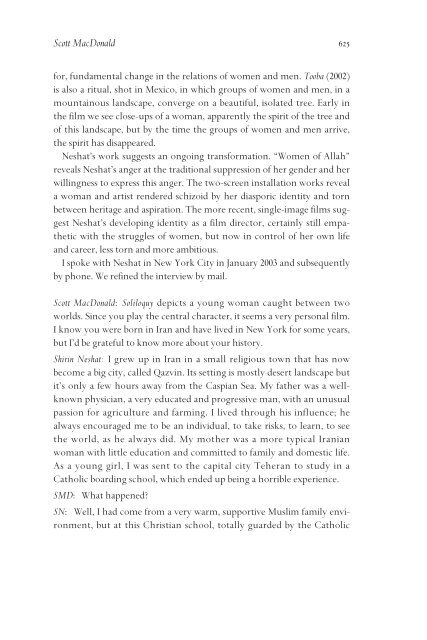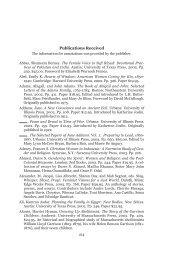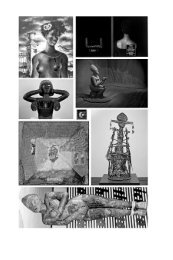An Interview with Shirin Neshat - Feminist Studies
An Interview with Shirin Neshat - Feminist Studies
An Interview with Shirin Neshat - Feminist Studies
Create successful ePaper yourself
Turn your PDF publications into a flip-book with our unique Google optimized e-Paper software.
Scott MacDonald 625<br />
for, fundamental change in the relations of women and men. Tooba (2002)<br />
is also a ritual, shot in Mexico, in which groups of women and men, in a<br />
mountainous landscape, converge on a beautiful, isolated tree. Early in<br />
the film we see close-ups of a woman, apparently the spirit of the tree and<br />
of this landscape, but by the time the groups of women and men arrive,<br />
the spirit has disappeared.<br />
<strong>Neshat</strong>’s work suggests an ongoing transformation. “Women of Allah”<br />
reveals <strong>Neshat</strong>’s anger at the traditional suppression of her gender and her<br />
willingness to express this anger. The two-screen installation works reveal<br />
a woman and artist rendered schizoid by her diasporic identity and torn<br />
between heritage and aspiration. The more recent, single-image films suggest<br />
<strong>Neshat</strong>’s developing identity as a film director, certainly still empathetic<br />
<strong>with</strong> the struggles of women, but now in control of her own life<br />
and career, less torn and more ambitious.<br />
I spoke <strong>with</strong> <strong>Neshat</strong> in New York City in January 2003 and subsequently<br />
by phone. We refined the interview by mail.<br />
Scott MacDonald: Soliloquy depicts a young woman caught between two<br />
worlds. Since you play the central character, it seems a very personal film.<br />
I know you were born in Iran and have lived in New York for some years,<br />
but I’d be grateful to know more about your history.<br />
<strong>Shirin</strong> <strong>Neshat</strong>: I grew up in Iran in a small religious town that has now<br />
become a big city, called Qazvin. Its setting is mostly desert landscape but<br />
it’s only a few hours away from the Caspian Sea. My father was a wellknown<br />
physician, a very educated and progressive man, <strong>with</strong> an unusual<br />
passion for agriculture and farming. I lived through his influence; he<br />
always encouraged me to be an individual, to take risks, to learn, to see<br />
the world, as he always did. My mother was a more typical Iranian<br />
woman <strong>with</strong> little education and committed to family and domestic life.<br />
As a young girl, I was sent to the capital city Teheran to study in a<br />
Catholic boarding school, which ended up being a horrible experience.<br />
SMD: What happened?<br />
SN: Well, I had come from a very warm, supportive Muslim family environment,<br />
but at this Christian school, totally guarded by the Catholic




